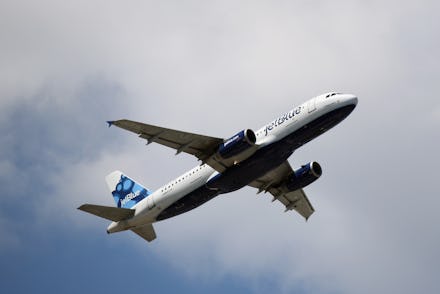JetBlue wants to be the first carbon-neutral airline in the U.S.

On Monday, JetBlue released a statement that declared the company's intent to go 'carbon neutral' on all domestic flights starting on July 2020. In a partnership with Carbonfund.org, JetBlue plans to reduce its carbon emissions wherever possible and offset the rest with contributions towards environmental causes. By doing so, JetBlue will aim to have a net-zero carbon footprint and become the first major U.S. airline that is carbon neutral.
The announcement comes after heightened public awareness of the damage air travel inflicts on the environment. Airline flights generally produce more carbon emissions per passenger than other means of transportation, like trains or buses, while also creating additional waste that creates an even larger carbon footprint. It's a problem that other airlines have attempted to fix — Qantas, an Australian-based airline, has experimented with a zero-waste flight that produced no landfill waste. Delta and American Airlines, both U.S.-based airlines, are transitioning to eco-friendly cutlery to reduce single-use plastics.
But while reducing waste is good, the carbon emissions from burning airplane fuel is still a doozy. According to an article by The New York Times, flights make up more than one-tenth of all transportation-related carbon emissions. 'Flight shaming' became a thing for a while in 2019 with one in five travelers flying less as consumers became more aware of air travel's impact on the environment.
The amount of carbon emissions from air travel is an unavoidable fact that JetBlue openly acknowledges and strives to improve.
"As an airline, we admit that we emit," said Sophia Mendelsohn, head of sustainability and environmental social governance at JetBlue, on the company's climate leadership webpage. "While we work toward renewable jet fuel options and ‘carbon-neutral’ flying, offsets are one small way we’re addressing emissions."
These offsets involve donating to projects and causes that can decrease the amount of CO2 in the air. This includes contributions to forest protection projects, landfill gas capture, and solar/wind energy production. In total, from 2008 to now, JetBlue has purchased the equivalent of over 2.6 billion pounds of CO2 offsets.
"We reduce where we can and offset where we can’t," explained Robin Hayes, JetBlue's CEO, in a press release. "By offsetting all of our domestic flying, we’re preparing our business for the lower-carbon economy that aviation — and all sectors — must plan for."
Hayes knows carbon offsets aren't the only solution to going carbon neutral, however. "Carbon offsetting is a bridge to, not a silver bullet for, a lower carbon future," he continued. "Reducing and mitigating our greenhouse gas emissions is a fundamental aspect of our business plan and our mission to inspire humanity."
To that end, JetBlue is expanding on other current initiatives to reduce its carbon footprint. The aviation company has made a deal with Neste, a renewable diesel producer, to purchase sustainable aviation fuel that's made from biological sources — like food waste and renewable feedstocks. JetBlue is also in talks with the FAA for more direct flight trips that will optimize or reduce fuel use. The airline has also purchased planes that are more aerodynamic, which reduces its fuel use and emissions.
As climate change and global warming continue to put a spotlight on damaging industry practices and wasteful behavior, companies could be spurred into taking greater steps to reduce their carbon footprint. Hopefully, JetBlue won't be the only U.S. airlines to make helpful adjustments to their businesses.